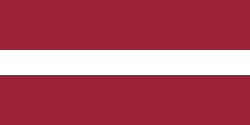Latvia
 From Rationalwiki
From Rationalwiki Latvia, or, the Republic of Latvia, is a country in northern Europe, sandwiched between Lithuania to the south and Estonia to the north. Latvians mostly speak—surprise, surprise—Latvian, which is one of only three surviving Baltic languages, the other two being Latgalian, which is spoken in the east of the country by about 200,000 people, and Lithuanian which is spoken—surprise, surprise—in Lithuania. Like most Baltic states, Latvia has a large Russian-speaking minority, a leftover from the Soviet times, which causes a fair amount of friction.
History[edit]
Ancient days[edit]
Present-day Latvia was settled by the Balts sometime around 3000 BCE, and their descendants still comprise most of the population. After centuries of being relatively undisturbed, the Livs, Latvians, etc. were the target of a crusade by German knights in the early thirteenth century CE. These Baltic Germans![]() never represented more than 10% or so of the population, but kept things firmly under their control. Foreign rule would continue until after World War I.
never represented more than 10% or so of the population, but kept things firmly under their control. Foreign rule would continue until after World War I.
Independence part I[edit]
An independent Latvian state was created on 18 November 1918, with the defeated Germans handing over control later that month; however German troops remained to protect Latvia against newly-communist Russia. A civil war then followed between the Germans, ethnic Latvians, and the Soviet Red Army. The Polish-Soviet War also intruded.[1]
Peace and the new state were established in 1920, and initially, Latvia seemed to be a successful parliamentary democracy, recovering well from the war and weathering the Great Depression. But then, as happened in much of Europe in the 1930s, an authoritarian leader came to power. Kārlis Ulmanis was already Prime Minister for the agrarian-nationalist Latvian Farmers' Union party, but in 1934 he declared a state of war, dissolving parliament, banning political parties, and imprisoning his rivals (mainly Social Democrats). In 1936 he became president as well as prime minister, and during his rule, he established a paternalistic, corporatist dictatorship somewhat modelled after Mussolini's. His government was not overtly racist, but worked hard to promote the Latvian language and culture.[2][3]
At the start of World War II, Ulmanis's only option was to make a deal with the Russians, and in October 1939 the Soviet–Latvian Mutual Assistance Treaty was signed and ratified.[4] This allowed Russia to station a limited number of troops (supposedly to protect it from Nazi Germany) and provided the pretext for Stalin to forcibly annex Latvia to the USSR on June 17, 1940. The Soviets formed a new government which voted to join the USSR, somewhat suspiciously; the Soviets then deported about 35,000 undesirables to Siberia.[5] Latvia ceased to exist as a de facto independent state and was part of the USSR until 1990, although German forces did, ironically enough, briefly seize power during Barbarossa. As elsewhere the Nazis murdered the Jewish population in the Holocaust.[6] The Soviet Armed Forces retook almost all of Latvia in the latter stages of the war, the exception being the Courland pocket which the Nazis held onto until their formal surrender to the Soviet Union.
Russian rule[edit]
After the Germans were driven out, Latvia was restored but as the Latvian Soviet Socialist Republic. The Soviet Union completed the collectivization of Latvian agriculture and encouraged large numbers of Russians to relocate to Latvia and make the country less Latvian than it had ever been. As in Lithuania, the people wanted their political system to be the Latvian Republic without the "Soviet" and "Socialist" parts. Latvians got that wish in 1991 as the Soviet Union disintegrated.
Independence part II[edit]
Gorbachev allowed Latvia greater autonomy, and by the end of his rule, the country's government had renamed the country the Republic of Latvia and things were all set for independence. The Russians attempted to capture key installations in January 1991, but this failed, and on 3 March 1991 an advisory referendum showed a majority for independence. However, there was the issue of all the Russians there - before the referendum, citizenship was promised to all residents, but subsequent laws restricted citizenship to those with Latvian ancestry before 1940, leaving many ethnic Russians who had moved there during Soviet rule stateless.[7]
Summary[edit]
A short animated video on the history of Latvia can be seen here.
Latvian jokes[edit]
Latvia is well-known for being the butt end of jokes about extreme poverty, namely the lack of even cheap food, such as potatoes. These anecdotes supposedly originated around 2009, making fun of "Obscure Former Soviet Nations Western People Don't Know Shit About" and Latvia became a stand-in for them all.[8] These days, though, the people of Latvia eat a fair amount of other food, like buckwheat.
References[edit]
- ↑ See the Wikipedia article on History of Latvia.
- ↑ See the Wikipedia article on Kārlis Ulmanis.
- ↑ Kuck, Jordan Tyler, "“The Dictator without a Uniform: Kārlis Ulmanis, Agrarian Nationalism, Transnational Fascism, and Interwar Latvia”. " PhD diss., University of Tennessee, 2014.
- ↑ See the Wikipedia article on Soviet–Latvian Mutual Assistance Treaty.
- ↑ History of Latvia: A brief synopsis, Latvian Embassy to the USA, 2014
- ↑ Latvia, Holocaust Encyclopedia, United States Holocaust Memorial Museum, Washington, DC
- ↑ Not just a simple twist of fate: statelessness in Lithuania and Latvia, European Network on Statelessness, 2018
- ↑ http://www.chrisconnollyonline.com/2013/04/195-history-and-origins-of-latvian-jokes.html
Categories: [European countries] [Member states of the European Union] [NATO member states]
↧ Download as ZWI file | Last modified: 12/28/2025 06:08:39 | 113 views
☰ Source: https://rationalwiki.org/wiki/Latvia | License: CC BY-SA 3.0

 KSF
KSF